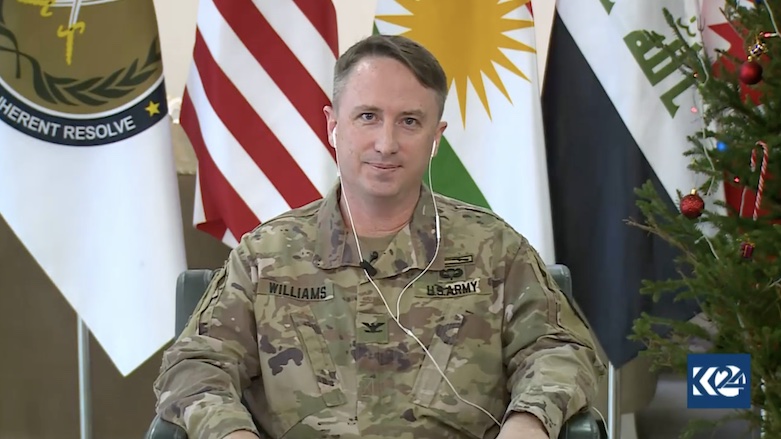Director of Kurdistan Coordination Center: ISIS threat remains, Coalition remains to fight it
“I’m lucky enough to have a great job in the Coalition, where I get to work with the Peshmerga and other Kurdish security forces.”

WASHINGTON DC (Kurdistan 24) – “The threat of ISIS remains, and that’s why the Coalition is still here,” Col. David Williams, the Director of the Kurdistan Coordination Center (KCC), recently affirmed.
Speaking to Kurdistan 24 last week, Williams noted that the threat from the so-called Islamic State was “particularly strong” in some of the areas disputed between Erbil and Baghdad.
“That’s why we’re encouraging both sides to conduct operations to share intelligence,” he continued, “so the coalition can enable operations to defeat ISIS” in those areas.
Williams made clear that he very much appreciated the position that he now holds. “I’m lucky enough to have a great job in the Coalition,” he said, “where I get to work with the Peshmerga and other Kurdish security forces.”
The Coalition is present in the Kurdistan Region (and elsewhere in Iraq) in an advisory and support capacity, rather than for combat itself.
As Williams explained, the Coalition “works very closely with the Peshmerga and other security forces” in multiple ways: by sharing intelligence; advising at the operational level; and providing military equipment to the Peshmerga.
He explained that the Erbil-based KCC was established some six years ago, as the fight against the so-called Islamic State began, and the US, Britain, Germany, and the Netherlands “created a multi-national advisory group,” which “is enabling Peshmerga reform” in order “to make it a more capable force” and “a more modernized force going forward in the future.”
Williams explained that in the beginning, there were some 36 projects relating to Peshmerga reform, and “we’re down to about 26 projects right now.”
The State Department—consulates and embassies—have the lead on this issue, he stated, “but we do enable” the diplomats “with Peshmerga reform.”
He further explained that the Coalition was responsible for “the joint coordination mechanisms,” which “include establishing joint coordination centers along the Kurdish coordination line between both the Iraqis and the Kurds.”
Williams highlighted the Joint Combined Coordination Center in Erbil, “where Iraqi officers and Peshmerga officers” have been “working together since 2015.”
“The Center was key to the defeat of ISIS, particularly in Mosul,” he noted, “as Iraqi divisions came into the Kurdistan area” to clear Iraq’s second-largest city, which the terrorist group had captured in June 2014.
“This Center still operates every day here in Erbil—passing intelligence; coordinating ground movements; and just showing how the Iraqi Security Forces and the Kurdish Security Forces can work hand in hand” to secure “the final defeat of ISIS,” he said.
“Absolutely, we’ll continue to support the Peshmerga Forces,” Williams affirmed. “That’s why I’m here, and the team—we’re from all different countries—are here supporting the Peshmerga” and that work “will continue.”
In emphasizing the continuity of the Coalition mission in Erbil, Williams echoed recent comments from Joel Rayburn, the State Department’s Special Envoy for Syria, who told journalists that while “ISIS has been defeated as a territorial caliphate,” they are still present “as a clandestine terrorist network, and they’re still trying to evolve into a guerilla-type insurgency, both in Syria and Iraq.”
“There’s more work to be done,” Rayburn added, and “you will continue to see the United States and the Global Coalition do that work. I don’t see that mission ending until the job is done.
Read More: US: We will remain in Syria, Iraq
Williams noted that there had been a recent shift in the Coalition’s mission in Iraq, as it, after several years in the country, had transitioned “to another phase.”
“We’ve really moved away from the tactical level training to the operational level advising mission over the last few months,” he said, which chanced to coincide with the coronavirus pandemic.
“But that doesn’t change our support for the Iraqi Security Forces. It doesn’t change our support to the Kurdish Security Forces,” Williams continued. “The Coalition is still here to help them, assist them, in the final defeat of ISIS, and we’re not going to let corona stop us from doing that.”
Asked about the recent rocket attack on Baghdad’s “Green Zone,” Williams deferred to higher headquarters. But he did say, “We have the right to defend ourselves,” and “we hope these attacks do not ever occur again.”
Indeed, in the week since, there have been no such assaults. Following the Dec. 20 rocket attack, US President Donald Trump met with his national security team to discuss US options for military retaliation against Iran.
Subsequently, Trump tweeted, “Some friendly health advice to Iran: If one American is killed, I will hold Iran responsible. Think it over.”
Editing by Karzan Sulaivany